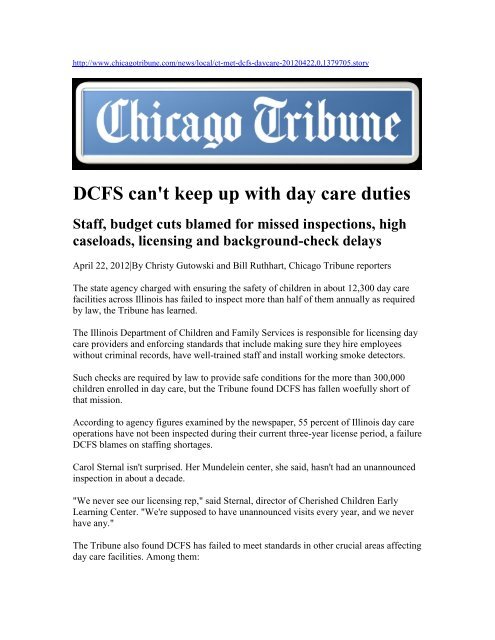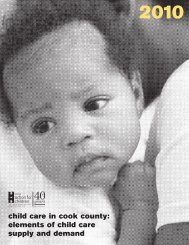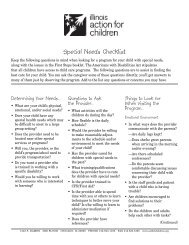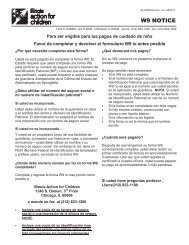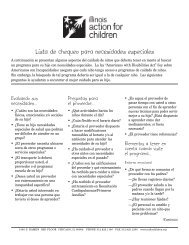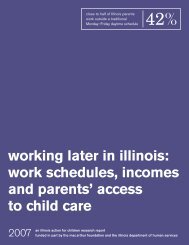DCFS can't keep up with day care duties - Illinois Action for Children
DCFS can't keep up with day care duties - Illinois Action for Children
DCFS can't keep up with day care duties - Illinois Action for Children
Create successful ePaper yourself
Turn your PDF publications into a flip-book with our unique Google optimized e-Paper software.
http://www.chicagotribune.com/news/local/ct-met-dcfs-<strong>day</strong><strong>care</strong>-20120422,0,1379705.story<strong>DCFS</strong> <strong>can't</strong> <strong>keep</strong> <strong>up</strong> <strong>with</strong> <strong>day</strong> <strong>care</strong> <strong>duties</strong>Staff, budget cuts blamed <strong>for</strong> missed inspections, highcaseloads, licensing and background-check delaysApril 22, 2012|By Christy Gutowski and Bill Ruthhart, Chicago Tribune reportersThe state agency charged <strong>with</strong> ensuring the safety of children in about 12,300 <strong>day</strong> <strong>care</strong>facilities across <strong>Illinois</strong> has failed to inspect more than half of them annually as requiredby law, the Tribune has learned.The <strong>Illinois</strong> Department of <strong>Children</strong> and Family Services is responsible <strong>for</strong> licensing <strong>day</strong><strong>care</strong> providers and en<strong>for</strong>cing standards that include making sure they hire employees<strong>with</strong>out criminal records, have well-trained staff and install working smoke detectors.Such checks are required by law to provide safe conditions <strong>for</strong> the more than 300,000children enrolled in <strong>day</strong> <strong>care</strong>, but the Tribune found <strong>DCFS</strong> has fallen woefully short ofthat mission.According to agency figures examined by the newspaper, 55 percent of <strong>Illinois</strong> <strong>day</strong> <strong>care</strong>operations have not been inspected during their current three-year license period, a failure<strong>DCFS</strong> blames on staffing shortages.Carol Sternal isn't surprised. Her Mundelein center, she said, hasn't had an unannouncedinspection in about a decade."We never see our licensing rep," said Sternal, director of Cherished <strong>Children</strong> EarlyLearning Center. "We're s<strong>up</strong>posed to have unannounced visits every year, and we neverhave any."The Tribune also found <strong>DCFS</strong> has failed to meet standards in other crucial areas affecting<strong>day</strong> <strong>care</strong> facilities. Among them:
• The agency has at least a monthlong backlog of criminal background checks it conductson <strong>day</strong> <strong>care</strong> employees. Critics say it can take as long as nine months <strong>for</strong> <strong>DCFS</strong> toprocess such reports.• Licensing officials who make inspections handle an average of 100 facilities each,double the number recommended in some national guidelines.• <strong>DCFS</strong> fails to process 56 percent of new <strong>day</strong> <strong>care</strong> applications and license renewals<strong>with</strong>in 90 <strong>day</strong>s, its benchmark, prompting complaints from some providers who fearlosing grant money because their licenses have lapsed.The en<strong>for</strong>cement problems underscore other shortcomings in an agency that also hasstruggled <strong>with</strong> high caseloads in the division that handles child abuse and neglect cases.The Tribune reported last month that those caseloads often were double what they shouldbe and that <strong>DCFS</strong> was violating critical terms of a 1991 federal consent decree settingmonthly limits on new cases <strong>for</strong> investigators.Those shortcomings prompted <strong>DCFS</strong> Director Richard Calica to freeze hiring in theagency's other units — including <strong>day</strong> <strong>care</strong> licensing — to free <strong>up</strong> resources <strong>for</strong> neglectand abuse cases.<strong>DCFS</strong>, however, acknowledges it also has a <strong>day</strong> <strong>care</strong> problem.In the short term, the agency is hiring four temporary workers to reduce its backgroundcheckbacklog; it also plans to hire more licensing workers this year.Marlowe rejected that notion, saying <strong>DCFS</strong> takes its licensing responsibility seriously.But he also said the agency's budget and staff have been cut <strong>for</strong> several consecutive yearsand the lack of funding has hampered its ability to meet standards.That includes making the background checks of <strong>day</strong> <strong>care</strong> workers. Marloweacknowledged those checks are running a month behind. New employees are allowed towork in <strong>day</strong> <strong>care</strong> facilities while the checks are pending, as long as they are not alone<strong>with</strong> children.But the delay can be much longer than a month, said Lori Longueville, a child <strong>care</strong>official who works <strong>with</strong> <strong>day</strong> <strong>care</strong> providers in southern <strong>Illinois</strong>.Longueville said she just got background check results this month from <strong>DCFS</strong> that weresubmitted in July.The agency's inspector general, Denise Kane, has gotten complaints about thebackground delays and confirmed her office is investigating.
Staffing shortages at <strong>DCFS</strong> also have led to long delays in issuing and renewing licenses.The agency is s<strong>up</strong>posed to process applications <strong>with</strong>in 90 <strong>day</strong>s, but <strong>DCFS</strong> does so only44 percent of the time, the Tribune found.The director of a North Shore <strong>day</strong> <strong>care</strong> center, who asked not to be identified, said shesent in a license renewal application in July that wasn't approved until eight months later.The delay cost the facility $3,000 in grant money because its license was allowed tolapse, money that would have gone to facility <strong>up</strong>grades, she said."The system is clearly broken," she said. "Something needs to happen be<strong>for</strong>e somethingreally serious or tragic happens <strong>with</strong> kids."Child deathsWhen tragedies do occur, assessing blame isn't easy.The Tribune examined nearly one dozen incidents in the last five years in which a childeither died or was abused at an <strong>Illinois</strong> <strong>day</strong> <strong>care</strong> facility.In each case, <strong>DCFS</strong> records and interviews indicate the agency recently had inspected thefacility — in some cases the visits were unannounced, in others announced. Violationswere noted in some incidents, but none was clearly linked to what happened.That was the case in the January 2009 death of 16-month-old Benjamin Kingan, who diedafter suffering injuries at Minee Subee <strong>day</strong> <strong>care</strong> center in Lincolnshire. Teacher's aideMelissa Calusinski was sentenced to 31 years in prison <strong>for</strong> throwing the toddler to thefloor.Calusinski was alone in a room <strong>with</strong> eight children, which violated standards requiring atleast one other adult be present, prosecutors said. The <strong>day</strong> <strong>care</strong>'s owner, Judith Katz, wascharged <strong>with</strong> instructing employees to lie to police about how many adults were presentwhen Benjamin was injured. Katz died last Sun<strong>day</strong>, the <strong>day</strong> be<strong>for</strong>e the case was to go totrial.Records indicate <strong>DCFS</strong> regularly visited Minee Subee, including a March 2008inspection 10 months be<strong>for</strong>e Benjamin's death. No violations were found during thatvisit, but a handful were noted during a 2007 inspection, including improper childs<strong>up</strong>ervision.Minee Subee employees told <strong>DCFS</strong> that while its 2007 and 2008 inspections weres<strong>up</strong>posed to be unannounced, the owner knew when the annual inspection was coming, atleast in part because they tended to fall near the same dates. The center operateddifferently on those <strong>day</strong>s, records show.A lawyer <strong>for</strong> the slain boy's family said employees told him that <strong>DCFS</strong> visits were rarelyunannounced, and that the licensing representative notified them a visit was planned.
"That's one of the things that's really got to change — otherwise how do you really knowthat what you are seeing is how they are truly operating?" said attorney Francis PatrickMurphy, who brokered a $2 million settlement against the center. "Of course they'regoing to be in compliance when the visits are announced."Marlowe said he had no direct knowledge of the allegation that <strong>DCFS</strong> workers notifiedthe <strong>day</strong> <strong>care</strong> of impending visits, but he acknowledged that monitoring visits typically fellaround the same time of year.Patricia Goodman, a Lake County <strong>day</strong> <strong>care</strong> advocate and retired <strong>DCFS</strong> licensings<strong>up</strong>ervisor, said the inspections would be more thorough if workers had lighter caseloads."We may never know if better <strong>DCFS</strong> monitoring could have exposed some of thepotential dangers these children faced," Goodman said of the Minee Subee case. "Butwhat we do know is we can do better."To thwart such tragedies, Marlowe said <strong>DCFS</strong> would have to be present in facilities allthe time."I think that's just wishful thinking to say more monitoring and inspections would preventsomeone from snapping on a crying child and throwing them to the ground," he said. "Ihave yet to look into one of these incidents and find that we hadn't been there."An Aurora girl's death in August shows even repeated <strong>DCFS</strong> intervention <strong>can't</strong> alwaysprevent a tragedy. Abigail Holland, 2, attended an unlicensed home that <strong>DCFS</strong> hadvisited twice and instructed to shut down, records show.<strong>DCFS</strong> responded to a complaint that the home was operating illegally and ordered TracyKennedy to stop caring <strong>for</strong> children until she received a license, according to agencyrecords. A <strong>DCFS</strong> official also noted that an aboveground pool in the backyard wasn'tproperly secured, the records show.Less than two months later, Abigail drowned in that pool after wandering outside whileKennedy was inside, alone <strong>with</strong> nine other children, according to records. Kennedy wascharged <strong>with</strong> endangering the life of a child and operating <strong>with</strong>out a license. She haspleaded not guilty.Calls <strong>for</strong> changeAdvocates, including <strong>Illinois</strong> <strong>Action</strong> <strong>for</strong> <strong>Children</strong>, pushed this spring <strong>for</strong> legislation thatwould transfer <strong>day</strong> <strong>care</strong> licensing from <strong>DCFS</strong> to the <strong>Illinois</strong> Department of HumanServices. They argue that early childhood development is more central to that agency'smission and that too many facilities aren't inspected.
The human services agency opposed the switch, as did <strong>DCFS</strong>' Calica, who said it wouldtake the power to shut down a <strong>day</strong> <strong>care</strong> site away from his agency, which investigatesabuse and neglect.Although the bill gives <strong>DCFS</strong> more than a year to compile a report on whether it ismeeting per<strong>for</strong>mance standards, it did not address the agency's staffing shortages."We're putting in greater accountability measures and transparency and making themfocus on whether they are improving," said Sen. Dan Kotowski, D-Park Ridge, the bill'ssponsor.Deborah Green is among those who say the state must do more.Her son, 22-month-old Darjon Taylor, died of smoke inhalation after another child leftuns<strong>up</strong>ervised at Porter's Playhouse on the South Side sparked a fire in the basement,according to records.<strong>DCFS</strong> inspected the <strong>day</strong> <strong>care</strong> two months be<strong>for</strong>e the January 2008 fire and issued aviolation <strong>for</strong> insufficient working smoke detectors, a problem a <strong>DCFS</strong> official said theoperator corrected, records show.A lawsuit that resulted in a $3 million judgment <strong>for</strong> the mother alleged the <strong>day</strong> <strong>care</strong> hadpoor s<strong>up</strong>ervision and inadequate smoke detectors. It also said the owner hadn't conductedmandated fire drills and first tried to extinguish flames instead of evacuating the sixchildren, five of whom survived.Green did not collect a dime. Under <strong>Illinois</strong> law, homes <strong>with</strong> <strong>up</strong> to 12 children are notrequired to have liability insurance."They should change the law," said Thomasine Porter, who owned Porter's. "We shouldhave had it. I did, but at one point, I let it lapse. … I wish she could have the money. Itruly wish she could."Green remembers vividly her final words to Darjon: "Goodbye, Poo Poo. Mommy lovesyou."The flood of memories — and pain — prompts her to warn other parents to be vigilant."If it happened once, it can happen again," she said through tears. "Do your research.Don't count on the system to investigate."


